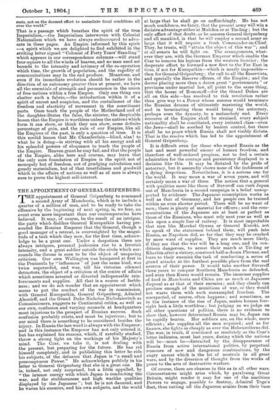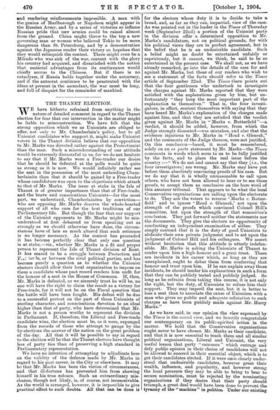T HE appointment of General Gripenberg to command a second Army
of Manchuria, which is to include a quarter of a million of men, and to be ready to take the offensive by the beginning of next spring, is, we fear, an event even more important than our contemporaries have believed. It may, of course, be the result of an intrigue, the party which dislikes General Kuropatkin having per- suaded the Russian Emperor that the General, though a good manager of a retreat, is overweighted by the magni- tude of a task which they now, for the first time, acknow- ledge to be a great one. Under a despotism there are always intrigues, personal jealousies rise to a feverish intensity, and a great soldier outside the circle which sur- rounds the throne is sure to be the object of unsparing criticism. Our own Wellington was hampered at first in the Peninsula by " influences " of just the same kind, was twice superseded, and was, till his victories silenced detractors, the object of a criticism at the centre of affairs which sometimes arrested or diverted indispensable rein- forcements and supplies. All that is a source of feeble- ness; and we do not wonder that an appointment which seems to put the conduct of the war in commission, with General Kuropatkin, General Gripenberg, Admiral Alexeieff, and the Grand Duke Nicholas Nicholaievitch as Commissioners, suggests to Continental critics, as well as our own, confusion and varying counsels at headquarters most injurious to the prospect of Russian success. Such confusion probably exists, and must be injurious ; but to our mind there is something to be considered besides the injury. In Russia the last word is always with the Emperor; and in this instance the Emperor has not only uttered it, but has explained his reasons, which, if carefully studied, throw a strong light on the workings of his Majesty's mind. The Czar, we take it, is not dealing with the present, but preparing for the future. He has rid himself completely, and in publishing this letter he rids his subjects, of the delusion that Japan is "a small and presumptuous Power." He acknowledges publicly in his letter to General Gripenberg that she is a great one. He is, indeed, not only surprised, but a little appalled, by "the intense energy with which Japan is conducting the war, and the stubbornness and high warlike qualities displayed by the Japanese "; but he is not daunted, and he warns his enemies, and his own subjects, and the world at large that he shall go on unflinchingly. He has not much confidence, we fancy, that the present army will win a decisive advantage either at Mukden or at Tie-ling ; but the only effect of that doubt, as he assures General Gripenberg and all mankind, is that he will employ a second army so large that it will require a fresh Commander-in-Chief. They, he trusts, will "attain the object of this war "; and at all events he will fight on. The arrangements, what- ever they are, with the German Emperor which enable the Czar to remove his legions from the western frontier; the desperate effort to forward a new fleet to the Far East in time, if not for Kuropatkin—which is nearly impossible— then for General Gripeuberg ; the call to all the Reservists, and specially the Reserve officers, of the Empire ; and the decree placing more than a dozen great " governments " or provinces under martial law, all point to the same thing, that the house of Romanoff—for the Grand Dukes are all on this side—has resolved to risk revolution rather than give way to a Power whose success would terminate the Russian dreams of ultimately mastering the world, and in terminating them would bring the autocracy, perhaps even the dynasty, to a melancholy end. Every resource of the Empire shall be strained, every subject nationality shall be conciliated, every irritated class—even the Jews—shall be soothed by lenient control, but there shall be no peace which Russia shall not visibly dictate. That is the resolve which has led to the appointment of General Gripenberg.
It is difficult even for those who regard Russia as the last and most powerful enemy of human freedom, and therefore of well-ordered progress, not to feel a certain admiration for the courage and persistency displayed in a decision like this. It may be dictated by the pride of autocracy, but it assuredly shows none of the feebleness of a dying despotism. Nevertheless, it is a serious one for the world. It may mean a war of seven years, and will certainly mean a war of three. The notion that a general with qualities more like those of Suvoroff can rush Japan out of Manchuria in a second campaign is a belief unsup- ported by evidence. The Japanese conscription works as well as that of Germany, and her people can be trained within an even shorter period. There will be no want of men ; there is plenty of material for officers ; and the com- munications of the Japanese are at least as perfect as those of the Russians, who must rely next year as well as this upon a single line of railway. It is most improbable that men like Marshal Oyama or General Kuroki, not to speak of the statesmen behind them, will push into Russia, as Napoleon did, so far that they may be crushed by mere want of supplies. They are much more likely, if they see that the war will be a long one, and its con- ditions dangerous, to arrest their march at Tie-ling or Kharbin after a victory, construct half-a-dozen Plevnas, and leave to their enemies the task of conducting a series of grand attacks at the furthest possible place from the real sources of their power. It would take another Suvoroff three years to conquer Southern Manchuria so defended, and even then Korea would remain. The immense supplies of food in Manchuria and China are as much at Japanese disposal as at that of their enemies ; and they clearly can produce enough of the munitions of war, or they would not waste them with such unexampled freedom. The unexpected, of course, often happens ; and sometimes, as in the instance of the rise of Japan, makes human fore- sight look a little worthless ; but judging as we judge on all other questions of politics, there is no evidence to show that, however determined Russia may be, Japan can be rapidly beaten. Her soldiers are, on the whole, more efficient ; she supplies all the men required ; and as for finance, she fights as cheaply as ever the Hoheuzollerns did. The war, in truth, if continued as resolutely as the Czar's letter indicates, must last years, during which the nations will be—must be—distracted by the disappearance of Russia from active international politics, by perpetual rumours of new and dangerous combinations, by the angry unrest which is the lot of neutrals in all great wars, and by the diversion of thought from the works of peace to the arts of destructive warfare.
Of course, there are chances in this as in all other wars. Circumstances might arise which, by paralysing Great Britain, might render it easy for one of the maritime Powers to engage, possibly to destroy, Admiral Togo's fleet, thus cutting off the Japanese armies from their base and rendering reinforcements impossible. A man with the genius of Marlborough or Napoleon might appear in the Russian Army, and by a series of victories so inflame Russian pride that new armies could be raised almost from the ground. China might throw to the top a, new governing man or woman who believed Tokio to be more, dangerous than St. Petersburg, and by a demonstration against the Japanese render their victory so hopeless that they would relinquish the contest. There might even be a Mikado who was sick of the war, content with the glory his country had acquired, and dissatisfied with the notion that material advantages from its continuance would chiefly accrue to the Chinese. But if there is no cataclysm, if Russia holds together under the autocracy, and if the autocrat continues to be penetrated with the ideas at present in the ascendant, the war must be long, and full of disquiet for the remainder of mankind.























































 Previous page
Previous page